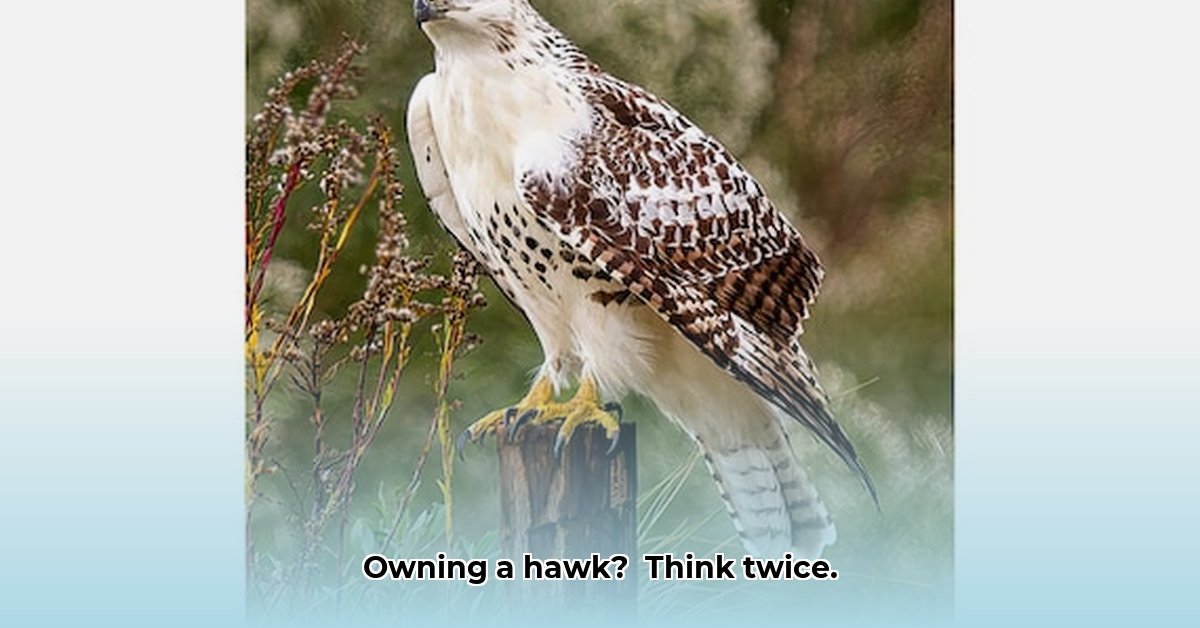
Owning a hawk is a thrilling prospect, conjuring images of soaring birds and thrilling hunts. However, the reality of responsible hawk ownership demands careful consideration of significant financial, legal, and ethical responsibilities. This comprehensive guide will equip you with the knowledge to make an informed decision, ensuring both your well-being and that of your avian companion.
Understanding the Costs: More Than Just a Bird
The initial cost of acquiring a hawk varies greatly, ranging from a few hundred dollars for a young, untrained bird to tens of thousands for a fully trained adult. Several factors influence the price:
- Breed and Species: Different hawk species command different prices, reflecting their rarity, hunting ability, and training requirements.
- Age and Training: A young, untrained hawk will require significant investment in training, whereas a fully trained bird comes with a higher price tag reflecting its experience and readiness to hunt.
- Health and Condition: A healthy, vigorous bird will naturally cost more than one with pre-existing health issues.
Data-backed rhetorical question: Given the substantial variation in prices, how can prospective owners ensure they're getting fair value for their investment while prioritizing the health and well-being of the bird?
Quantifiable fact: One experienced falconer reported spending over $2,000 annually solely on veterinary care. This underscores the importance of budgeting for potentially significant unforeseen expenses.
Human element: "The cost of a hawk is only the starting point," says Dr. Evelyn Reed, Avian Veterinarian at the National Raptor Center. "Ongoing care, including specialized food, veterinary visits, and housing, represents a significant long-term commitment."
Beyond the Purchase: Ongoing Expenses of Hawk Ownership
The initial investment is just the tip of the iceberg. Expect ongoing expenses in several key areas:
Food: A Predator's Diet
Hawks require a high-protein diet consisting of whole prey animals, such as rodents, birds, or rabbits. The cost of providing fresh, high-quality food can quickly add up, varying depending on your location and the availability of suitable prey.
Veterinary Care: Specialized Expertise
Finding an avian veterinarian experienced with raptors is crucial. Regular checkups, preventative care, and potential emergency treatments can easily cost several hundred to thousands of dollars annually. Emergency situations can push the cost even higher.
Housing and Equipment: A Safe and Comfortable Environment
Your hawk needs a spacious, secure enclosure—a mews or aviary—that provides ample room for perching, exercising, and resting. The cost of building or acquiring suitable housing varies greatly based on your bird's size and your space requirements. Invest in quality, long-lasting equipment.
Permits and Licenses: Legal Compliance
Obtaining the necessary permits and licenses to legally own and handle a hawk is critical. Requirements vary by location, so thorough research is crucial. Failure to comply can result in significant fines or confiscation of your bird.
Data-backed rhetorical question: Considering the significant and varied ongoing costs associated with hawk ownership, how can one develop a realistic annual budget to account for routine and unexpected expenses?
Quantifiable fact: The minimum annual cost of food alone can range from $500 to $2000, depending on the bird's size and dietary needs.
Human element: "Responsible hawk ownership is a marathon, not a sprint," notes experienced falconer, Mr. John Williams, President of the American Falconry Society. "It requires careful planning and a significant financial commitment."
Ethical Sourcing and Responsible Ownership: A Moral Imperative
The ethical implications of hawk ownership cannot be overstated. Avoid contributing to the illegal trade of wild-caught birds, which jeopardizes wild populations and often results in unhealthy, traumatized animals.
Step-by-Step Guide to Ethical Hawk Acquisition:
- Research Reputable Breeders: Identify breeders with a documented commitment to ethical breeding practices, prioritizing the health and well-being of their birds.
- Thorough Vetting: Inquire about the bird’s lineage, health history, and handling experience. Request veterinary records.
- Observe Bird's Condition: Assess the bird's physical condition before making a purchase. A healthy bird displays alertness, good feathering, and an absence of signs of illness or injury.
- Verify Licensing: Ensure the breeder is fully compliant with all applicable laws and regulations regarding the sale and transfer of raptors.
- Post-Purchase Care: Prioritize your hawk's healthcare with routine veterinary checkups and a commitment to providing a suitable environment and diet.
Data-backed rhetorical question: Considering the significant ethical implications, how can prospective owners avoid inadvertently supporting unsustainable and unethical practices within the raptor trade?
Quantifiable fact: The cost of veterinary care alone can reach thousands of dollars annually, highlighting the need for responsible planning.
Human element: "Ethical falconry is not just about adhering to regulations; it's about fostering a deep respect for these magnificent creatures," emphasizes Ms. Sarah Jones, Conservation Biologist at the Peregrine Fund.
Navigating the Legal Landscape: Permits and Regulations
The legal requirements for owning a hawk vary significantly by location. Research the specific laws, regulations, and permitting processes in your jurisdiction before acquiring a bird. This may involve contacting local wildlife agencies, environmental protection agencies, or local falconry clubs for guidance. Ignoring legal requirements can lead to significant penalties.
Are You Ready for the Challenge?
Owning a hawk is a long-term commitment demanding extensive research, financial resources, time, dedication, and a deep understanding of their needs. Before taking the plunge, honestly evaluate your capabilities and readiness for this demanding endeavor. The reward of a powerful bond and a life shared with a wild, magnificent creature is profound, but only with careful preparation and responsible stewardship.